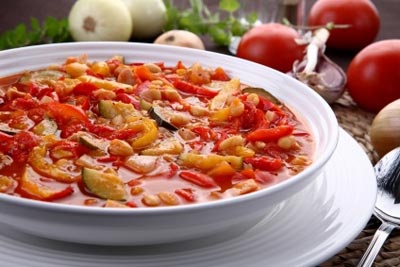(单词翻译:单击)
情景对话
Todd: So, Ruth, now, you are a vegetarian.
托德:鲁斯,你是一个素食主义者。
Ruth: That's right.
鲁斯:没错。
Todd: So what is a good vegetarian dish that you cook?
托德:那你最擅长烹饪的素食菜肴是什么?
Ruth: Well, actually, I'm not a very good cook, so that would be difficult to say. I quite like to make, like a vegetable stew with tofu in it. Things like that, but it's not very exciting.
鲁斯:嗯,实际上,我并不是个好厨师,所以这很难说。我喜欢在炖菜里面放豆腐。我喜欢这种食物,但并不是很令人兴奋。
Todd: Well, how do you make the stew?
托德:嗯,你怎么做炖菜?
Ruth: Well, firstly, you get all of the vegetable ready and so you chop them up and the potatoes and you boil the potatoes and then you boil the other vegetables, and you fry the tofu with onions and then I think you just put it all together in a pan and stick it in the oven, I think.
鲁斯:首先,把蔬菜准备好,然后切碎,把土豆煮熟,之后再煮其他蔬菜,把豆腐和洋葱一起炒熟,之后我想把这些一起放在盘子里,再放入微波炉。
Todd: Sounds pretty good.
托德:听起来真不错。
Ruth: It's very easy.
鲁斯:非常简单。
Todd: What vegetables do you usually put inside the stew?
托德:你通常在炖菜里面放什么蔬菜?
Ruth: Oh, things like carrots and lettuce and courgettes sometimes, mushrooms, and really any vegetables that are in season that I can get hold of.
鲁斯:哦,我会放胡萝卜、生菜,有时还会放小胡瓜和蘑菇,通常我会放我能买到的应季蔬菜。
Todd: Courgettes? Is that squash? Zucchini?
托德:Courgettes?那是南瓜还是小胡瓜?
Ruth: I think it might be squash. No, I think it's zucchini.
鲁斯:我想应该是南瓜。不,我觉得应该是小胡瓜。
Todd: Zucchini.
托德:小胡瓜。
Ruth: I think it's zucchini.
鲁斯:我觉得是小胡瓜。
Todd: OK, yeah, I think in the states we call it zucchini.
托德:好的,我想在美国我们称为zucchini。
Ruth: And you would call aubergine, eggplant.
鲁斯:我们说茄子是aubergine,而你们则称之为eggplant。
Todd: Yes. What do you call eggplant?
托德:对,你们怎么说茄子?
Ruth: Aubergine.
鲁斯:Aubergine就是茄子。
Todd: Aubergine.
托德:Aubergine茄子。
Ruth: Yeah.
鲁斯:对。
Todd: How do you spell it?
托德:这个词怎么拼?
Ruth: Good question. A-U-B-E-R-G-I-N-E.
鲁斯:好问题。A-U-B-E-R-G-I-N-E。
Todd: Wow. How do you spell courgettes?
托德:哇。courgettes小胡瓜怎么拼?
Ruth: C-O-U-R-G-E-T-T-E。
鲁斯:C-O-U-R-G-E-T-T-E。
Todd: That's pretty good. Now can you spell Zucchini?
托德:真不错。现在你会拼Zucchini小胡瓜了吗?
Ruth: Probably not. Z-U-C-C-H-I-N-I.
鲁斯:可能拼不出来。Z-U-C-C-H-I-N-I是吗。
Todd: Yeah, maybe that's it. One more time.
托德:对,可能是。再拼一次。
Ruth: Z-U-C-C-H-I-N-I.
鲁斯:Z-U-C-C-H-I-N-I。
Todd: Yeah, I think that's it. Zucchini. I'm not even sure.
托德:对,没错。就是这个。其实我不太确定。
Ruth: I'm not either.
鲁斯:我也不确定。
Todd: Yeah, what's your favorite vegetable?
托德:好,那你最喜欢的蔬菜是什么?
Ruth: Ah, it has to be broccoli.
鲁斯:啊,那一定是绿菜花。
Todd: Oh, yeah?
托德:哦,是吗?
Ruth: I really like broccoli. They look like little trees, there that's nice.
鲁斯:我真的非常喜欢绿菜花。它们看起来像小树一样,非常不错。
Todd: Yeah, that's true. Yeah, if you just get one broccoli and start eating it, you can't even finish it. It's just so big.
托德:对,没错。好,如果你有一个绿菜花,那你永远都吃不完。因为它太大了。
Ruth: Oh, you can. You definitely can.
鲁斯:哦,当然可以吃完。你绝对可以吃完。
Todd: Well, how do you cook your broccoli?
托德:嗯,你会怎么烹饪绿菜花?
Ruth: Just very briefly really because there's nothing worse than soggy broccoli. You cook it. You boil it in a pan with water only for a three or four minutes. What's your favorite vegetable?
鲁斯:非常简单,没有比淖绿菜花更简单的了。只有把它放进锅里用水煮三四分钟就好了。你最喜欢的蔬菜是什么?
Todd: That's a good question. I would have to go with the eggplant and the "aubergine"?
托德:这是个好问题。我想那一定是茄子,你们是说aubergine吗?
Ruth: Aubergine.
鲁斯:对,aubergine。
Todd: Aubergine. So the aubergine as you call it, yeah.
托德:茄子。就是你们称为aubergine的茄子。
Ruth: I think eggplant's the best. Really, don't you think they're sometimes a bit soggy?
鲁斯:我想茄子是最棒的。你不觉得它们也应该蒸熟了吃吗?
Todd: Actually I kind of like them that way.
托德:实际上我不喜欢那样吃。
Ruth: Really.
鲁斯:是吗?
Todd: Yeah. I like them any way. Although the bad thing about the eggplant is you can't eat it raw.
托德:是啊。不管怎么说,我很喜欢茄子。不过茄子最不好的就是不能生吃。
Ruth: Yeah, that's true. It takes effort.
鲁斯:对,没错。需要加工。

译文属可可原创,仅供学习交流使用,未经许可请勿转载
重点讲解
重点讲解:
1. chop up
切碎;剁碎;
eg. Chop up three firm tomatoes.
拿3个硬西红柿切碎。
eg. I don't like to chop up onions. That makes me cry.
我不喜欢切洋葱,它令我掉眼泪。
2. in season
(水果等)正旺;当令;应季;
eg. Some fruits are in season.
有些水果现在正是应季。
eg. Hotel rooms are more expensive in season.
旅游旺季时,旅馆的房费很贵。
3. get hold of
(通常指好不容易)得到,获得;
eg. He read everything he could get hold of and formed his own conclusions.
他查阅了他能搞到的一本资料,然后作出自己的结论。
eg. The only electrician we could get hold of was miles away.
我们唯一能够联络到的电工离这里有好几英里远。


